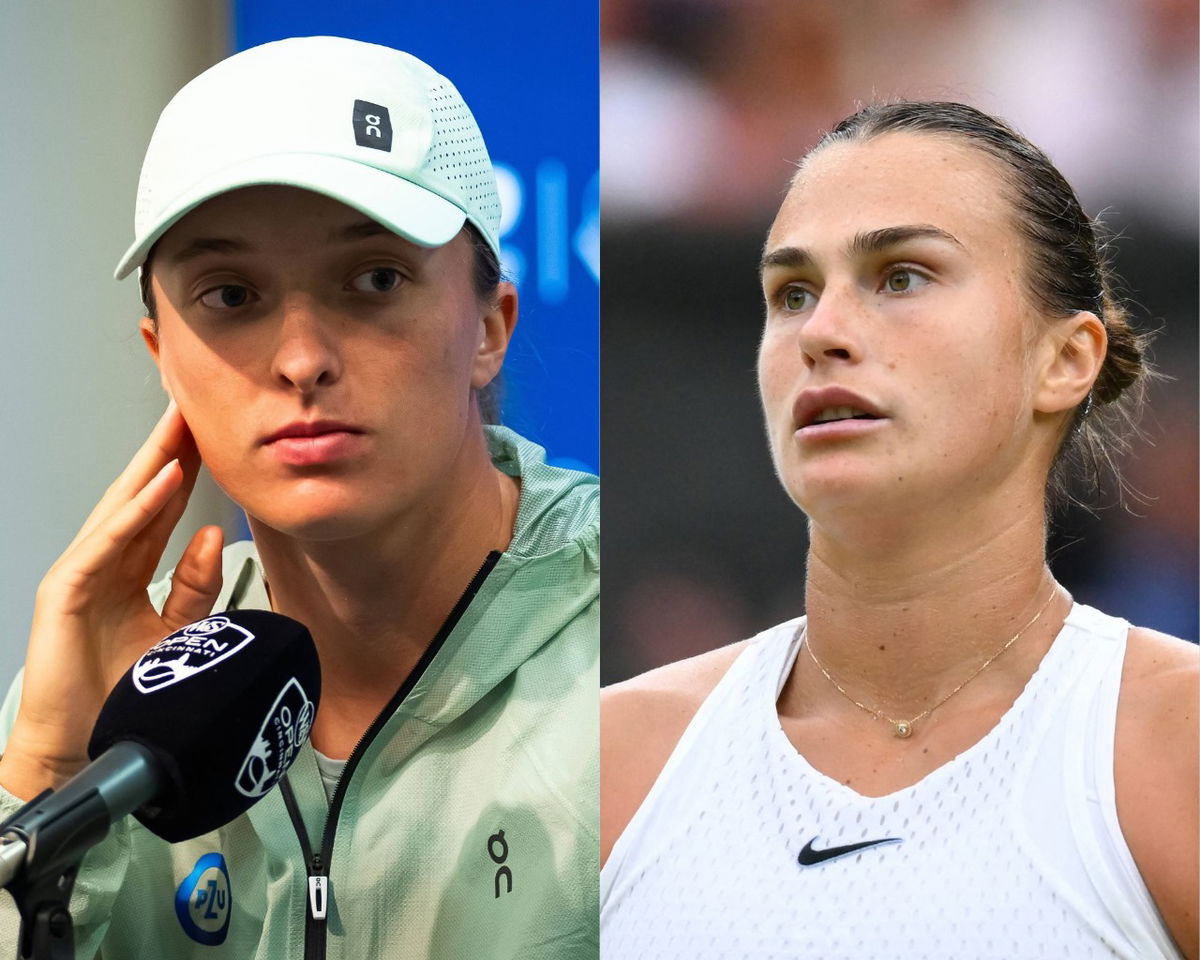
Imago
Image Credits – Imago

Imago
Image Credits – Imago
Back in March, when Novak Djokovic, Jannik Sinner, Aryna Sabalenka, and Coco Gauff stood among 20 leading voices demanding fairness, the message thundered through tennis. Their handwritten signatures, featuring 10 of the top 11 women, including Polish powerhouse Iga Swiatek, etched a bold stand: Grand Slams must channel more of their soaring revenues into player welfare and raise prize money “to a more appropriate percentage of tournament revenues, reflective of the players’ contribution to tournament value.” They urged a louder player voice in “decisions that directly impact” them. Now, as the WTA season nears its end, Swiatek strikes again, calling out Grand Slams for their rising profits and fading conscience.
Watch What’s Trending Now!
One of the brightest voices in women’s tennis has spoken again, and this time, the message cuts sharper than ever. Iga Swiatek, along with several top WTA stars, is calling on the four Grand Slams to return to the negotiating table. “For sure it would be great if the Grand Slams wanted to talk to us, because that’s how it’s supposed to be and I don’t really get why there’s no more open conversation,” Swiatek told AFP in Riyadh, where the WTA Finals are unfolding under bright lights and heavy tension.
Her words echoed beyond the arena, slicing through the calm of complacency. She added, “It’s not only about prize money, but also about the pension, the health plan and just having more smooth cooperation and communication in the future. So I think for sure it’s a setback and for sure the players are not happy with it.” The tone was unmistakable, measured yet fiery, a champion’s voice demanding fairness, not favor. Even Aryna Sabalenka, the fiery world No. 1, didn’t mince her words in Riyadh. Discussing the impasse during the WTA Finals, she declared, “I think it’s the time right now to sit at a table and come to a conclusion that everyone will be happy with.” Her message was clear: enough of the delays, it’s time for action.
ADVERTISEMENT
Behind the scenes, the silence has been deafening. According to people familiar with the matter and documents seen by AFP, the dialogue that once showed promise hit a wall during the summer. The majors informed players they would have to “postpone looking into their proposals until other matters have been resolved.” That single statement froze the momentum of what was meant to be a historic step forward for athlete empowerment.
Swiatek: It would be great if the Grand Slams wanted to talk to us because that’s how it’s supposed to be and I don’t really get why there’s no more open conversation. I think for sure it’s a setback and for sure the players are not happy with it.”https://t.co/JSNKNIpAup
— Reem Abulleil (@ReemAbulleil) November 6, 2025
Those “other matters” were heavyweights of their own, the ongoing lawsuit filed by the Professional Tennis Players Association (PTPA) and discussions about a potential “premium tour” that could reshape tennis’ future.
ADVERTISEMENT
Yet, according to AFP’s understanding, the players weren’t buying the delay. On July 30, a second letter landed on the desks of the majors, where players stated in unison that plans for future tour reforms “should not delay action.” It was a defiant reminder that promises without progress mean little in a sport built on endurance.
As the summer wore on, small signs of movement flickered. Only the U.S. Tennis Association (USTA) and the All England Club (AELTC) sat down with player representatives during the U.S. Open in September. The meetings were brief, the intentions unclear, and since then, communication has again gone silent. The disconnect between tennis’s power brokers and the athletes who fill stadiums has rarely felt so wide.
ADVERTISEMENT
Among the proposals now gathering dust is a visionary plan: a Grand Slam Player Council. Much like the ones that exist within the ATP and WTA tours, this council would give athletes a formal seat at the table to be consulted on prize money, scheduling, rules, and policy changes that directly affect their livelihoods. It’s a simple yet seismic idea: that those who play the game should have a say in shaping it.
But the story runs deeper. Two months after the initial talks in March, the lawsuit expanded, broadening the battlefield. By July, the power centers of tennis: Wimbledon, Roland Garros, the U.S. Open, and the Australian Open, were drawn into negotiations, discussing pensions, healthcare, and player consultation. The doors cracked open, but progress moved at a crawl, tangled in legalities and hesitation.
Then came September 23, 2025, a pivotal date in tennis politics. The PTPA took a bold leap, asking the U.S. District Court for the Southern District of New York to officially add the governing bodies of all four Grand Slams as defendants, alongside the ATP and WTA.
ADVERTISEMENT
Their post on X thundered with conviction: “For years, professional tennis players and the PTPA have raised concerns about the systemic issues plaguing the sport. In March, we filed a landmark case challenging the status quo and demanding lasting reform.” Their mission was clear: to pull every key player into the legal ring and force a reckoning that could redefine tennis for generations.
Now, as Iga Swiatek raises her voice once more, she stands not alone but among a chorus of WTA peers who refuse to be sidelined. The world’s best are no longer content to rally in silence; they are demanding a future where their voices carry as much weight as their victories.
ADVERTISEMENT
Fellow WTA stars also urge Grand Slams to resume talks
Alongside Iga Swiatek and Sabalenka, several top WTA stars have stepped forward to voice their growing frustration over the stalled negotiations with the Grand Slams. Among them stands Jessica Pegula, serving not only as one of the top-ranked players but also as a WTA Player Council member, adding her thoughtful yet firm voice. “We’re just trying to be a united voice. I think it’s the first time we’ve actually been able to come together with both tours. And so that’s a testament to just everybody being really open-minded and wanting to come together on making our sport better and better for the players.” Her words painted a picture of unity rarely seen in tennis’s fragmented structure.
Australian Open champion Madison Keys also weighed in, her tone reflecting both resolve and restraint. She called the situation “obviously frustrating,” adding, “I feel like we’re doing it in a very above board, mature way. So I hope that the Grand Slams continue to have the conversations and are willing to move forward in a positive light.”
Top Stories
Carlos Alcaraz’s Decision to Sack Juan Carlos Ferrero Over Money Deemed “Ridiculous” by Former Pro

3x Grand Slam Champion Confirms Australian Open Return at 41 After Shocking Comeback

Rafael Nadal Returns to Tour With a Surprising Twist for Rising Stars

College Tennis Star Finds His Spark Back After Duke University Almost Made Him Quit

Iga Swiatek Opens Up About Financial Struggles and ‘Stressful’ Conditions During Her Childhood

Currently, players receive only about 13 to 15 percent of Grand Slam revenues as prize money, a figure they believe no longer reflects the sport’s booming economics. Their proposal aims to gradually raise that share to 22 percent, a shift they view as both fair and sustainable.
ADVERTISEMENT
Consider this: the 2025 US Open offered a record $90 million purse, up from $75 million the previous year, while Wimbledon has doubled its prize pool over the past decade. The money is there, the question is whether it will finally reach those who create the spectacle.
In response, an All England Club spokesperson told AFP that the organisation is “always open to having constructive discussions to achieve the best possible outcome,” assuring that “regular dialogue” with players continues.
Yet as the talks hang in the balance, the tennis world watches closely, wondering: will the stars finally get what they’re asking for?
ADVERTISEMENT
ADVERTISEMENT
ADVERTISEMENT
ADVERTISEMENT

